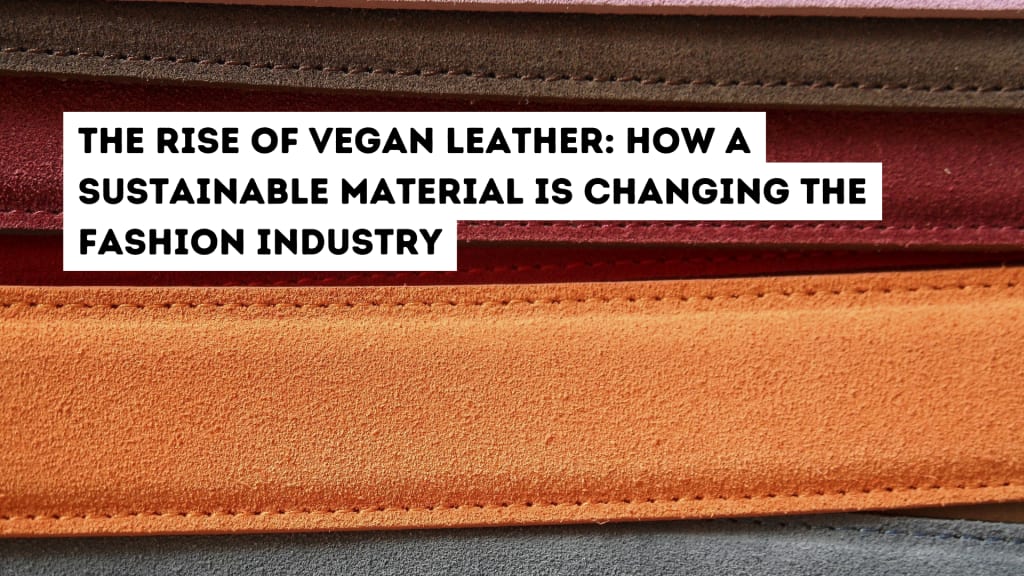The Rise of Vegan Leather: How a Sustainable Material is Changing the Fashion Industry
A look at the environmental and ethical implications of vegan leather

The Pros and Cons of Vegan Leather
Vegan leather has become increasingly popular in recent years, as more and more people are looking for alternatives to animal products. But is vegan leather really better for the environment?
On the one hand, vegan leather does have some environmental advantages over traditional leather. It requires less water, energy, and land to produce, and it does not contribute to the greenhouse gas emissions associated with livestock farming.
On the other hand, not all vegan leather is created equal. Some vegan leathers are made from synthetic materials, such as polyurethane, which can release harmful toxins during production and disposal. Other vegan leathers are made from plant-based materials, such as pineapple leaves or apple peels, which are more sustainable but can be more expensive.
So, which is better for the environment: vegan leather or traditional leather? It depends. If you choose a vegan leather made from a sustainable material, it may be a better choice for the environment. However, if you choose a vegan leather made from a synthetic material, it may not be any better for the environment than traditional leather.
Ultimately, the best way to choose a sustainable leather product is to do your research and choose a product that is made from a sustainable material and that is produced in a sustainable way.
Here are some additional things to consider when choosing a sustainable leather product:
The material: Choose a product that is made from a sustainable material, such as plant-based leather or recycled leather.
The production process: Choose a product that is produced in a sustainable way, using recycled water and energy, and minimizing waste.
The brand: Choose a brand that is committed to sustainability and that has a transparent supply chain.
By following these tips, you can help to reduce your impact on the environment and choose a leather product that is both sustainable and stylish.
The Pros of Vegan Leather
Environmental impact: Vegan leather has a much lower environmental impact than traditional leather. It requires less water, energy, and land to produce, and it does not contribute to the greenhouse gas emissions associated with livestock farming.
Animal welfare: Vegan leather does not require the slaughter of animals. This is a major advantage for people who are concerned about animal welfare.
Price: Vegan leather is often more affordable than traditional leather. This is because it does not require the same amount of processing and materials.
Versatility: Vegan leather can be used to make a wide variety of products, including bags, shoes, furniture, and clothing. This makes it a versatile option for people who are looking for a cruelty-free and sustainable alternative to leather.
The Cons of Vegan Leather
Durability: Vegan leather is not as durable as traditional leather. It can be more prone to scratches and tears.
Appearance: Vegan leather does not always look as good as traditional leather. It can sometimes have a plasticky appearance.
Longevity: Vegan leather may not last as long as traditional leather. It may need to be replaced more often.
Conclusion
Vegan leather has both pros and cons. It is a more sustainable option than traditional leather, but it is not as durable or long-lasting. Ultimately, the best choice for you will depend on your individual needs and preferences.
If you are looking for a sustainable and cruelty-free alternative to leather, vegan leather is a good option. However, if you need a durable and long-lasting product, you may want to consider traditional leather.
Plant-Based Leather
In recent years, there has been a growing interest in plant-based leather alternatives. These materials are made from sustainable resources, such as pineapple leaves, apple peels, and mushrooms. Plant-based leathers offer a number of advantages over traditional leather, including:
Sustainability: Plant-based leathers are made from renewable resources, which means that they do not contribute to deforestation or climate change.
Cruelty-free: Plant-based leathers do not require the slaughter of animals.
Versatility: Plant-based leathers can be used to make a wide variety of products, including bags, shoes, furniture, and clothing.
As the demand for sustainable and cruelty-free products continues to grow, plant-based leathers are likely to become more popular in the years to come.
About the Creator
Plantera Digital Media
welcome to my page here i share
- Stories
- Interesting facts about the world around us
- Thought-provoking theories about the nature of reality
- Useful information that can help people in their lives






Comments
There are no comments for this story
Be the first to respond and start the conversation.